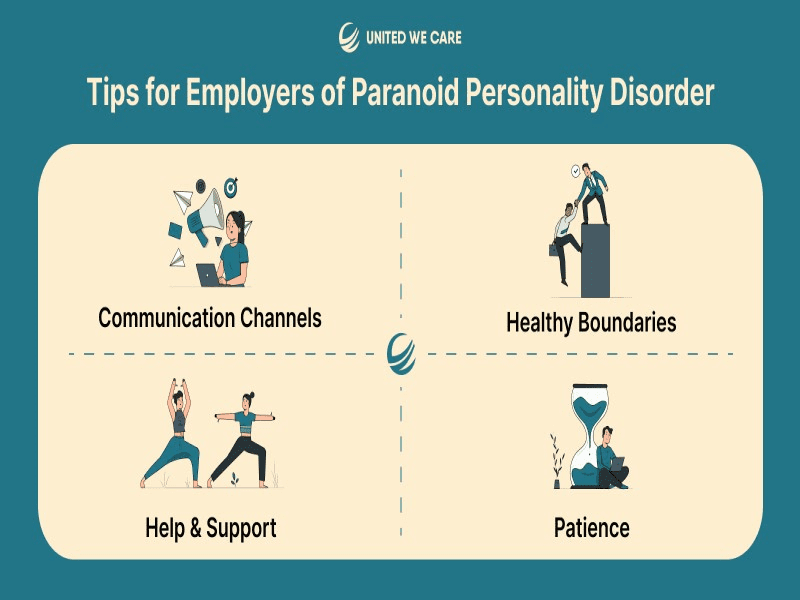Introduction
As the name suggests, paranoid personality disorder is a mental health condition where the person is affected by long-term patterns of distrust or suspicion.
Similarly, it is evident that the person with this disorder believes that the person is out to get them, demean, or threaten them with malicious intent. The result of people or individuals with this disorder is the difficulty of maintaining healthy workplace relationships. This also affects their efficiency at work.
What is paranoid personality disorder?
The ten personalities listed under The Diagnostic and Statistical Manual of Mental Disorders (DSM-5) include paranoid personality disorder. The characterization of this disorder is recurring patterns of suspicion, which is the end result of them having the thought process of seeing everyone around them as “conspiring against them.”
There are three groups that make up the classification of all the personality disorders that have been deciphered to date. Prevalent and representative behaviors and emotional reactions serve this classification. So, under these clusters, PPD falls under clusters amongst other clusters.
Cluster A basically includes paranoid personality disorder, which is defined as quirky, unusual, and malicious actions. It is a spiraling feeling of being cheated or conspired against without any evidence, which results in the person not having trust in almost anyone.
It is difficult to forgive a person with PPD as it is difficult to convince them otherwise. This makes other office colleagues in the workplace experience extreme misery and agony. This mindset or you may say a gut feeling of theirs, has been correct most of the time, but sadly, these very true incidents make up for the progression of developing this disorder. Which results in paranoia.
Impacts of Paranoid Personality Disorder in the Workplace
Naturally, it is difficult to build relationships with such individuals. Fostering a toxic work atmosphere is difficult for everyone. People affected with PPD have major trust issues trusting their colleagues or coworkers, managers, and sometimes even the company.
Generally, individuals with PPD exhibit signs of excessive vigilance and sensitivity to hazards. Oversensitivity to criticism and a reluctance to assign tasks in the workplace, even sharing professional information, are shown as external observations to other colleagues. All these symptoms are harmful to the productivity and efficiency of a person affected with PPD and their colleagues as well.
In addition, employees with PPD generally misread the messages given to them in the workplace. These take place when an innocent comment or a flick of sarcasm is used in the workplace with the person affected by PPD. All these situations are misread as malicious. Similarly, unforgiving and holding grudges for long amounts of time results in them countering back quickly.
How to overcome Paranoid Personality Disorder in the Workplace
Tips for Employers of Paranoid Personality Disorder
There are several tips on how to avoid the problems stated in the article previously. Below, you will find tips on how to maintain professionalism as well as understand them from a different light. The outlook on how to handle a person with a disorder would be easier to understand once we know how to?

Communication Channels
How an organization treats their employees and employers says a lot about their behavior towards their staff and also their demeanor towards their well-being.
Moreover, an organization can avoid a lot of hurdles by just being honest with those employees who expect professionalism and honesty. Employers and employees with paranoid personality disorder need direct and honest communication to avoid any misunderstandings or to avoid getting triggered. When around people with PPD, avoid hand gestures and languages with arbitrary meanings.
Healthy Boundaries
In any relationship, be it professional or personal, every person has their own set of boundaries and how they want to be treated. With the help of honesty, colleagues working with PPD-affected individuals should create healthy boundaries. This results in them being rest assured, and their paranoia does not get enacted.
Help & Support
In addition to honesty and healthy boundaries comes help and support. A colleague amongst PPD-affected individuals can help them by providing help with their mental health and as well as being compassionate to their disorder. The organization can also support by educating the employees and employers, in the form of workshops and training about the disorder and how it affects them on a daily basis.
Patience
Try to be understanding and patient if you think a coworker may be suffering from PPD. Always keep in mind that their mistrust and suspicion may stem from their circumstances rather than from anything you have done.
Treatment of employers with paranoid personality disorder in the workplace
Treatment for paranoid personality disorder (PPD) can be difficult due to the deep-seated suspicion of others, especially mental health professionals. Nevertheless, treatment consists of a mix of medication, psychotherapy, and guidance from mental health professionals. Remember, it’s critical to understand that there is no short answer for PPD and that treatment may need to be ongoing.
Psychoanalysis
There are three different ways in which psychoanalysis can help with paranoid personality disorder.
Firstly, Cognitive behavioral therapy, or CBT, assists people with PPD in recognizing and disputing their illogical ideas and beliefs. It can help to strengthen interpersonal bonds and lessen paranoia.
Next, people with PPD can explore their ideas, feelings, and behaviors in a private, safe environment through individual psychotherapy. A competent therapist can assist them in growing in self-awareness and coping mechanisms.
Lastly, group therapy can help by providing a safe and encouraging setting for practicing social skills and building trust. Additionally, it enables people to see that they are not struggling alone.
Pharmacotherapy
If a person with PPD exhibits significant paranoia, hallucinations, or delusional thinking, a doctor may prescribe antipsychotics. For example, risperidone and olanzapine are such drugs that can help control these symptoms.
Furthermore, anxiety or depression are possible side effects for some people with PPD. To treat these coexisting illnesses, doctors may prescribe antidepressants such as serotonin-norepinephrine reuptake inhibitors (SNRIs) or selective serotonin reuptake inhibitors (SSRIs).
How to Manage an Employee with Paranoid Personality Disorder
There are multiple things you can do to help employees dealing with paranoid personality disorder. Let’s take a closer look at some of these methods.
Educate and Raise Awareness
Naturally, it is critical to raise awareness of PPD and train managers, coworkers, and HR personnel. Gaining knowledge about the illness helps lessen stigma and encourage more compassionate responses from all.
Allowing Reasonable Accommodations
If you have identified individuals in your workplace struggling with paranoid personality disorder, you may have to shift gears. The idea is to make reasonable accommodations when possible so that the office is a safe space for them and can foster trust.
Generally, try to have candid conversations to ascertain their particular requirements. Additionally, make appropriate arrangements to assist in reducing stress at work. This may include having quieter workspaces or flexible work schedules.
Set Protocols for Conflict Resolution
If there is an established and transparent procedure for resolving conflicts, a lot of suspicion can be avoided. Your work culture can also be designed to encourage communication instead of assumptions. Moreover, ensure that disagreements are resolved in a timely and professional manner. If needed, think about utilizing an impartial mediator.
Frequent Check-Ins
Hold one-on-one meetings with staff members who have PPD on a frequent basis. Basically, you need to listen to their problems, offer feedback, and make sure they feel supported.
Conclusion
Managing the difficulties caused by paranoid personality disorder at work requires patience, understanding, and good communication. Employers may assist people with PPD to thrive professionally by creating a supportive and empathic work environment.
Employees should help by creating a more welcoming atmosphere for the individuals affected with paranoid personality disorder. Both the affected and the unaffected should gain professional mental health care for more assistance with any mental disorder-related questions and answers.
The complexities of these disorders are very difficult to understand with the information given on the internet and in articles. If you are a person seeking more professional assistance with clinical conditions such as paranoid personality disorder. We would suggest you talk to our experts from United We Care.
References
[1] Triebwasser, J. et al. (2013) ‘Paranoid personality disorder’, Journal of Personality Disorders, 27(6), pp. 795–805. doi:10.1521/pedi_2012_26_055.
[2] Lee, R.J. Mistrustful and Misunderstood: a Review of Paranoid Personality Disorder. Curr Behav Neurosci Rep 4, 151–165 (2017). https://doi.org/10.1007/s40473-017-0116-7
[3] Resnick, P.J. and Kausch, O. (1995) ‘Violence in the workplace: Role of the consultant.’, Consulting Psychology Journal: Practice and Research, 47(4), pp. 213–222. doi:10.1037/1061-4087.47.4.213.
[4] Willner, K.M., Sonnenberg, S.P., Wemmer, T.H. and Kochuba, M. (2016) ‘Workplace personality testing: towards a better way of determining whether personality tests are prohibited pre-offer medical exams under the Americans with Disabilities Act’, Employee Relations Law Journal, 42(3), 4+, available: https://link.gale.com/apps/doc/A471000388/AONE?u=anon~c56b7d0&sid=googleScholar&xid=d48c079f [accessed 16 Oct 2023].









